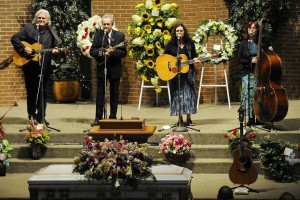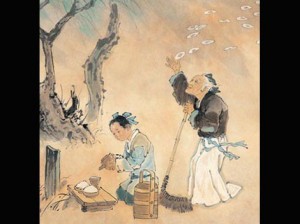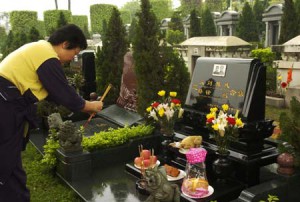 Every job has its unique challenges, and being a funeral director is no exception. When you meet a funeral director, you are hopefully met with a compassionate human being who exhibits all the appropriate decorum for the preparation of a sad event that surrounds a funeral service. There is much to be taken care of whether or not you were prepared for the passing of a loved one. All around, a funeral director is a caregiver. This professional not only takes care of the details for viewing, memorial service music, funeral bulletins, eulogies and much more but is a shoulder to lean on for the bereaved. While outwardly a funeral director may appear calm and in charge, there’s a lot going on behind the scenes that causes stress.
Every job has its unique challenges, and being a funeral director is no exception. When you meet a funeral director, you are hopefully met with a compassionate human being who exhibits all the appropriate decorum for the preparation of a sad event that surrounds a funeral service. There is much to be taken care of whether or not you were prepared for the passing of a loved one. All around, a funeral director is a caregiver. This professional not only takes care of the details for viewing, memorial service music, funeral bulletins, eulogies and much more but is a shoulder to lean on for the bereaved. While outwardly a funeral director may appear calm and in charge, there’s a lot going on behind the scenes that causes stress.
 Unfortunately, many funeral directors don’t operate with any personal boundaries. They often receive phone calls 24/7 for assistance, including the wee hours of the morning. For example, it is not uncommon for a hospice nurse to call a funeral director in the middle of the night requesting a pickup of the body for someone who has expired. Shortly after, another phone call comes in that another family is waiting for them at the funeral home for assistance. This lack of personal boundaries can often leave you vulnerable and can lead to depression. Family activities like attending a son’s soccer game or leisure activities must cancelled to take care of business. Its easy to be torn between the needs of your family and the needs of those you serve. Directors are also prone to evolving into workaholics. Many funeral homes are small businesses and lack the staff for shift work. It goes hand in hand with a lack of personal boundaries. Business may thrive and customers may be happy, but funeral directors wind up not spending time with their own families. Substance abuse and depression is often the end result.
Unfortunately, many funeral directors don’t operate with any personal boundaries. They often receive phone calls 24/7 for assistance, including the wee hours of the morning. For example, it is not uncommon for a hospice nurse to call a funeral director in the middle of the night requesting a pickup of the body for someone who has expired. Shortly after, another phone call comes in that another family is waiting for them at the funeral home for assistance. This lack of personal boundaries can often leave you vulnerable and can lead to depression. Family activities like attending a son’s soccer game or leisure activities must cancelled to take care of business. Its easy to be torn between the needs of your family and the needs of those you serve. Directors are also prone to evolving into workaholics. Many funeral homes are small businesses and lack the staff for shift work. It goes hand in hand with a lack of personal boundaries. Business may thrive and customers may be happy, but funeral directors wind up not spending time with their own families. Substance abuse and depression is often the end result.
When you think about it, funeral directors are faced with the reality of death 24/7. This immersion in death isolates them by profession. While you may not think you’re loved ones passing affects a funeral director, the constant passing of human beings does affect emotions. It is not uncommon for funeral directors to feel internally agitated and moody. The bottom line is that death makes funeral directors different. They can easily be pulled into the whole narrative of death and lose themselves.
By profession, funeral directors develop a high emotional pain tolerance to death. It’s almost a syndrome that cannot be avoided. Funeral directors that do a good job will often immerse themselves into the families situation and even make it harder on their own emotions. The constant exposure to death and unfortunate circumstances numbs the feelings. Depersonalization and lack of empathy can occur and scare off friends and family. It’s almost as though death chips away at one’s own humanity. They lose the ability to empathize with anything less than death. If you go through a tough breakup with a significant other, funeral directors often minimize the experience with comments like “Well, at least you’re still alive.” It’s easy to see how this transformation can adversely affect one’s personal relationships.
Funeral Directors Need To Be Their Own Caregivers
 Like most other caregivers, funeral directors often focus on caring for others and neglect self-care. Along with operating a 24/7 business with economic responsibilities, the demands of providing comfort for the bereaved can take its toll. Burn-out is common and known as “funeral director fatigue” or “compassion fatigue syndrome.” Before the final crash, there are many warning signs, including:
Like most other caregivers, funeral directors often focus on caring for others and neglect self-care. Along with operating a 24/7 business with economic responsibilities, the demands of providing comfort for the bereaved can take its toll. Burn-out is common and known as “funeral director fatigue” or “compassion fatigue syndrome.” Before the final crash, there are many warning signs, including:
-Isolation from others
-Depression and physical complaints
-Irritability and impatience
-Detachment and cynicism
-Loss of energy and exhaustion
There are a number of steps that funeral directors can take to avoid burn-out. Embracing modern technology can help streamline the workload. Instead of being tied down to the funeral home location to secure new business and provide families with 24/7 service, funeral directors can use pages and smart phones to conduct business more efficiently. Your funeral homes website is often now the first contact with a customer. A good website will educate and guide people to the solutions they need. Some sites even allow funeral or cremation services to be arranged online. A good answering Service for Directors like (ASD) can be an absolute godsend and help you relax more. Calls are screened to address urgent issues, and users can even log onto the web to see the activity of calls. With these modern services, business can be conducted from any location. Funeral directors can also hire removal services to transport decedents and lessen the workload with software companies that have developed programs to speed up the process of obituary placement, death certificate filing and much more. Moving away from the traditional funeral home business model of 24/7 availability still allows funeral directors to provide families with a personal touch. It’s just a different way of doing business.

Taking time to enjoy life with family and engaging in hobbies is an effective way to help reduce the stress. It also takes one away from the thoughts of death and to the thoughts of living life. Outdoor activities like fishing, skiing and just enjoying a leisurely day at the park or beach are ideal. After all, life is for the living. It’s also important to schedule vacation time to spend with family or friends. Having a circle of people around is a support group in itself.
Setting time boundaries for business and personal life is essential to maintain a balanced life. Funeral directors need to allot of certain amount of time for funeral planning and a certain amount of time for pleasure. Eating a balanced diet with the proper rest will also help one face the challenges of being in the biz.
For the most part, funeral directors today operate with one of two business models. The family service model is likely the most emotional draining of all. Little boundaries are set, and funeral directors are deeply integrated with the family. While it benefits customers with a personal and intimate approach, it often overburdens the funeral director emotionally. With a corporate owned funeral homes model, the relationship between the funeral director and clients is more detached. It’s more of a corporate perspective with a salesman style. With corporate firms, and the process is more like an assembly line with employees focusing on certain areas. While it doesn’t afford as much opportunity to develop personal relationships with clients, it does afford structured hours and good boundaries. Focus is on managing the bottom line.
Being a funeral director is a real challenge. Funeral directors must act as their own caregivers and fight to maintain the balance of having a life and taking care of business. Their own lives and families are worth it, and the clients they serve are worth it. If attaining a good balance is difficult, it’s smart to seek help or consider changing careers.
<a href=”https://plus.google.com/110779202088364960343?rel=author”>Join The Author Jeff Staab On Google Plus</a>







